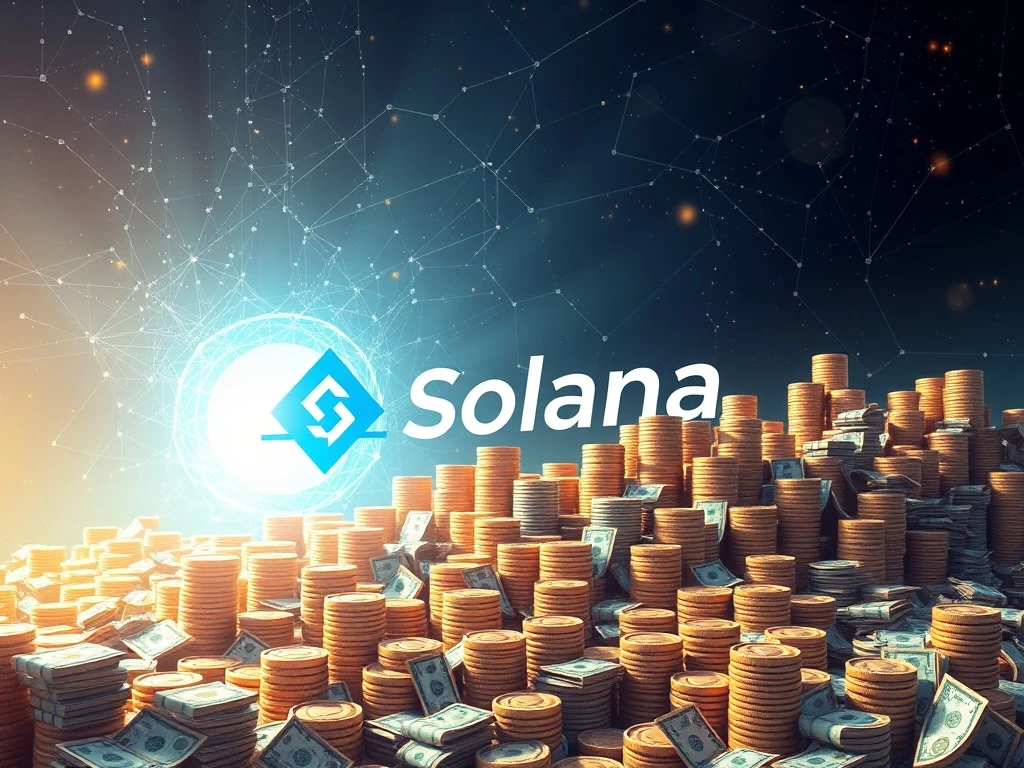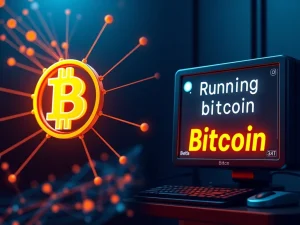Solana News: Accelerate’s Massive $1.51 Billion Raise Targets SOL Dominance

A seismic shift is underway in the crypto world, particularly for Solana enthusiasts. Recent Solana news reveals a groundbreaking development that could redefine institutional engagement with the blockchain. A newly launched fund, Accelerate, is making headlines with an ambitious target to raise $1.51 billion, aiming to become the largest Solana (SOL) holding treasury firm. This bold move signals growing institutional confidence in Solana’s ecosystem and its potential to reshape the decentralized finance (DeFi), NFT, and Web3 landscapes.
Accelerate Fund’s Ambitious Goal: Becoming the Largest Solana Treasury Firm
Accelerate, spearheaded by Joe McCann, the founder of Asymmetric Financial, has set its sights on acquiring up to 7.32 million SOL tokens. This strategy positions the Accelerate fund not just as a significant player, but as a potential titan in the Solana ecosystem. Unlike traditional hedge funds that often engage in active trading, Accelerate’s model prioritizes deep, long-term holdings of a single asset. It aims to function as a strategic reserve, signaling a profound belief in Solana’s enduring value and utility. This approach highlights a maturation in how large entities view and participate in the crypto space, moving beyond short-term speculation towards foundational support.
What This Means for the SOL Price and Market Dynamics
The sheer scale of Accelerate’s $1.51 billion target raise has significant implications for the market. A successful raise and subsequent acquisition of millions of SOL tokens could dramatically reduce the circulating supply of Solana on exchanges. This reduction in available tokens typically leads to upward pressure on the SOL price, fostering greater stability and confidence in the network. Such a large accumulation also grants the fund considerable influence over governance decisions within the Solana ecosystem, potentially steering its future development. However, this also introduces considerations around market concentration and centralization risks, which are important factors for investors and the community to monitor.
Accelerate’s Model: A New Era for Crypto Investment?
Accelerate’s strategy mirrors a broader trend where crypto treasury firms adopt concentrated positions to support ecosystem growth while mitigating short-term speculative selling. This model represents an evolving sophistication in crypto investment. While Joe McCann’s previous venture, Asymmetric Financial, faced challenges, his pivot to a Solana-specific, long-term holding strategy demonstrates adaptability. Investors must weigh McCann’s past against the innovative structure of Accelerate, which emphasizes deep ecosystem participation over agile trading. This shift from pure speculation to strategic asset accumulation could define the future of institutional engagement with digital assets.
The Broader Landscape of Solana News and Institutional Adoption
Solana’s inherent technological advantages remain central to its appeal. Its Proof-of-History (PoH) consensus mechanism and Sealevel architecture enable rapid transactions at low costs, attracting a robust developer ecosystem. Continuous innovation positions Solana as a strong contender in the race for blockchain dominance. Accelerate’s focus aligns with this trajectory, potentially accelerating adoption through strategic staking, governance participation, and funding for new projects. This latest Solana news highlights the growing confidence of institutional players in the network’s capabilities, despite ongoing challenges related to network stability and competition from other Layer 1 blockchains. For Accelerate, navigating crypto volatility and regulatory uncertainties will be crucial for realizing outsized returns.
The emergence of crypto treasury firms like Accelerate signals a significant maturation in institutional crypto adoption. These entities represent a fundamental shift from purely speculative trading to long-term asset accumulation, offering a structured framework for traditional finance to engage with digital assets. The outcomes of such ventures will likely shape the future of institutional investment in blockchain ecosystems, influencing both market dynamics and regulatory frameworks. Accelerate’s $1.51 billion target and Solana-centric strategy encapsulate the evolving sophistication of crypto investing. By combining deep technical conviction with a novel treasury model, the fund aims to redefine institutional engagement with blockchain technology. As it navigates market challenges and leverages Solana’s strengths, its trajectory will serve as a barometer for the broader adoption of crypto-focused institutional strategies.
Frequently Asked Questions (FAQs)
What is Accelerate?
Accelerate is a newly launched Solana-focused hedge fund aiming to become the largest Solana (SOL) holding treasury firm. It seeks to raise $1.51 billion to acquire a significant amount of SOL tokens.
What is Accelerate’s target fundraising goal?
Accelerate has set an ambitious target to raise $1.51 billion, intending to acquire up to 7.32 million SOL tokens.
How might Accelerate’s fundraising impact the SOL price?
A successful $1.51 billion raise could significantly reduce the circulating supply of SOL on exchanges, potentially leading to upward price pressure and signaling increased stability for the Solana network.
What are the primary risks associated with Accelerate’s strategy?
Key risks include crypto market volatility, regulatory uncertainties, and potential centralization risks due to the fund’s large accumulation of SOL tokens, which could grant it significant influence over governance decisions.
Who is Joe McCann, the founder of Accelerate?
Joe McCann is the founder of Asymmetric Financial. He is leading Accelerate, pivoting to a Solana-specific, long-term holding strategy after his previous venture reportedly faced significant declines.
What makes Solana an attractive investment for a fund like Accelerate?
Solana’s appeal lies in its technological advantages, including its high throughput, low transaction costs, and scalability, driven by its Proof-of-History (PoH) consensus mechanism. It also boasts a robust developer ecosystem and continuous innovation, making it a strong contender in the blockchain space.










